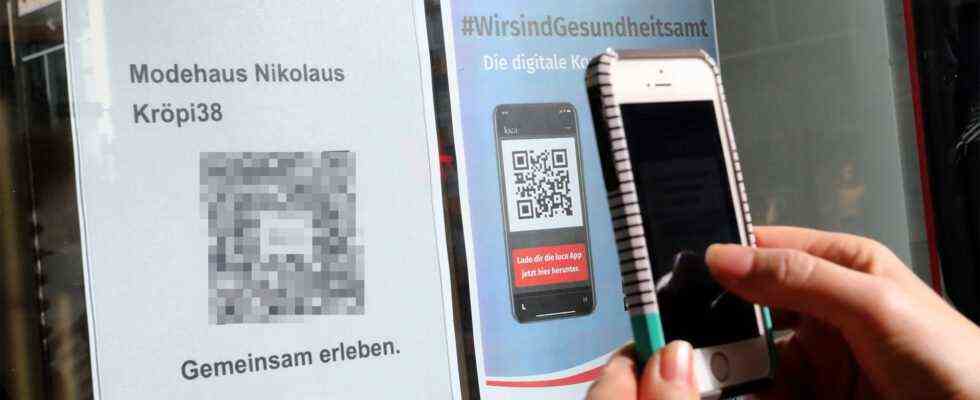fact finder
Status: 15.09.2021 10:09 a.m.
The Luca app is designed to help track contacts. But it hardly helps in containing the pandemic, many health authorities do not use it. The makers promise innovations.
When 13 federal states decided to use the Luca app in the spring, there was great hope. The app should help to identify contacts of people infected with corona and thus contain the pandemic. But about six months later, the results are sobering. The app seems increasingly worthless.
Last had the SR asked the health authorities in Saarland. Balance: Since its introduction, the app has not helped with a single corona case in identifying contact persons. There were more than 13,000 confirmed infections in Saarland during this period.
Similar figures come from the other federal states. In Bremen the data from the app could only be used sensibly five times, the health authority declared at the end of August. In Schleswig-Holstein, the health authorities in Kiel, Neumünster and the Rendsburg-Eckernförde district have requested data from the app a total of eight times in the past three months; in other circles, Luca has not yet been actively used.
The first municipalities are turning away
In Saxony-Anhalt, the app was only available from two health authorities in total in the past few months used twice, how MDRResearch showed. Even in Thuringia the hopes for the app were largely not fulfilled. Weimar and the Schmalkalden-Meiningen district therefore ended their cooperation after the test phase had ended at the end of August.
In Baden-Wurttemberg the Ministry of Health split up if specific numbers are not even available about contact tracking with the Luca app SWR-Inquiry with.
According to a survey by “Spiegel” in August, half of all affiliated health authorities in Germany have never asked for Luca data. And there, where the query was made, there were always problems. For example, after an outbreak in a bar on Sylt, the data could not be decrypted.
Luca makers are satisfied
The creators of the app oppose this and draw a positive interim balance. Between the beginning of June and the end of August, 126,000 people learned of a possible risk of infection through the Luca app, explained Luca publisher Culture4Life. During this period, the health authorities would have requested contact details of the visitors concerned collected 1750 times by companies.
“Those affected had the opportunity to adjust their own behavior before the health department contacted them,” said Luca managing director Patrick Hennig. That corresponds to 126,000 possible chains of infection that have potentially been interrupted.
Controversial from the start
The Luca app was controversial from the start. It is intended to replace the mess of paper that arises from analogue recording of visits to restaurants, exhibitions and other events. 13 federal states have a contract with Luca and spent more than 21 million euros on it. Only Saxony, North Rhine-Westphalia and Thuringia decided against a contractual commitment.
For months, privacy advocates, activists of the Chaos Computer Club and numerous scientists have criticized the application. You are bothered by the central data storage and consider the app to be ineffective.
The future seems questionable
The future of the Luca app seems questionable. The first federal states are already completely or partially dispensing with mass contact tracing in corona cases. North Rhine-Westphalia is also preparing Baden-Württemberg a change of strategy before.
In NRW, visitors to bars or restaurants no longer have to enter any data since the end of August. Gastronomy operators who still want to offer check-ins must do so with the Corona warning app. Because it collects the data anonymously – and after the amendment to the Corona Protection Ordinance, there is no longer a legal basis for recording contact data. Baden-Württemberg initially wants to hold on to data collection, even if the contacts of infected people are no longer to be followed.
In Hamburg, citizens already have to go shopping no longer provide contact details. Mayor Peter Tschentscher justified the Senate’s decision by saying that the measure would not have brought the hoped-for benefit.
App should be improved
The makers, on the other hand, want to expand and improve the Luca app in the fall. In the future, the doctors at the health authorities should be able to contact the users of the app directly and issue warnings in different levels. So far, app users have only received a general notification when a health department accesses a person’s Luca data. The update is currently being tested with the health authorities in Hamburg, Munich, Hanover, Stuttgart, Düsseldorf, Nuremberg, Augsburg and North Frisia, explained Hennig.
In the future, Luca will provide the authorities with further information about the venue – such as ventilation, size, walkways or room layout. “This helps health authorities to assess possible risks better, more easily and more quickly,” believes Hennig. The system can then also automatically recognize places with a possible increased infection rate, for example if two possible cases of infection are discovered in one place or more.

